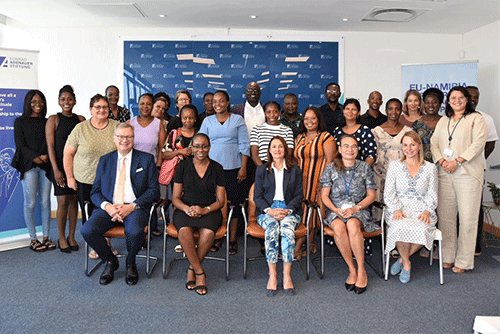The European Union (EU), Konrad Adenauer Foundation (KAS), and Women Action for Development launched the “Empowering CSOs, Women, Youth, and Marginalised Communities as Equal Partners in Democracy” (ECSO) project” to capacitate affected communities with necessary skills.
The three-year-long initiative is worth N$15 million, targeting //Karas, Kunene, and Erongo, where Civil Society Organisations (CSOs) predominantly address gender dynamics, youth empowerment, and the concerns of marginalised communities.
ECSO aims to strengthen these organisations through capacity building and advocacy activities.
ECSO Proj e ct Manage r Charlemaine Husselmann told New Era yesterday that scouting of specific projects started on 1 July 2023, where consultative sessions were held in selected regions to identify CSOs that will participate. She added that meetings were held with regional, local, and traditional authorities.
“Based on our initial assessment of them (CSOs) as we conducted a needs assessment in the first six months of the project, we observed that these projects mainly focused on engaging young girls and boys on issues around healthy relationships, while others ventured into activities such as gardening projects that they have initiated themselves,” she highlighted.
The organisation also approached the National Youth Council to identify some of these youth and projects they are doing within the communities. “Many of them are addressing youth unemployment and access to education and in terms of the marginalised communities, we approached the National Disability Council, as well as projects whose focus is on working with the San and Himba communities where they do not have access to resources in the regions,” she said.
Husselmann said this is not the first time that they have teamed up on projects to uplift and boost CSOs.
She indicated that from April 2020 until June 2023, they worked on the Straightening the Roles of CSOs, and Women in Democracy was a 30-month project that was again extended by nine months.
This project was implemented in Ohangwena, Omusati, and Kavango East and West.
With more interventions such as these, the team hopes to cover the whole country in due course.
By supporting selected CSOs in those areas, the goal was to empower women by strengthening their organisational and technical capacity to act as key interlocutors on gender, gender equality, and Gender-based Violence (GBV) at the local, regional, and national levels, she said.
EU ambassador to Namibia, Ana- Beatriz Martins said the overall aim of the project is to help these CSOs strengthen their capacities to strive for sustainability and impactful community change, in line with Namibia’s Vision 2030.
She noted that Namibia is progressive and ambitious in the defence of civil rights and that since independence, Namibia has demonstrated a strong commitment to human rights and gender equity which is reflected in various laws and policies that address women’s equality and protection.
“When looking at these goals, much remains to be done to enforce the laws in full. Several factors stand in the way of Namibia’s ambition to make genuine progress: patriarchal structures, harmful gender practices, and extremely high levels of gender-based violence. Societal structures continue to limit women’s access to land, justice, finance, civic participation, and decision-making at household and community levels,” said Martins.
She echoed that civil society play a crucial role in amplifying the voices of women in democracy and development discourse.
“Building on past achievements, this new programme aims to address some of the current challenges through capacity building and advocacy of CSOs. As a result, we expect to better equip CSOs with the ability and capacity to interact with authorities and complement the government’s efforts to promote gender equality,” said Martins.
-psiririka@nepc.com.na


